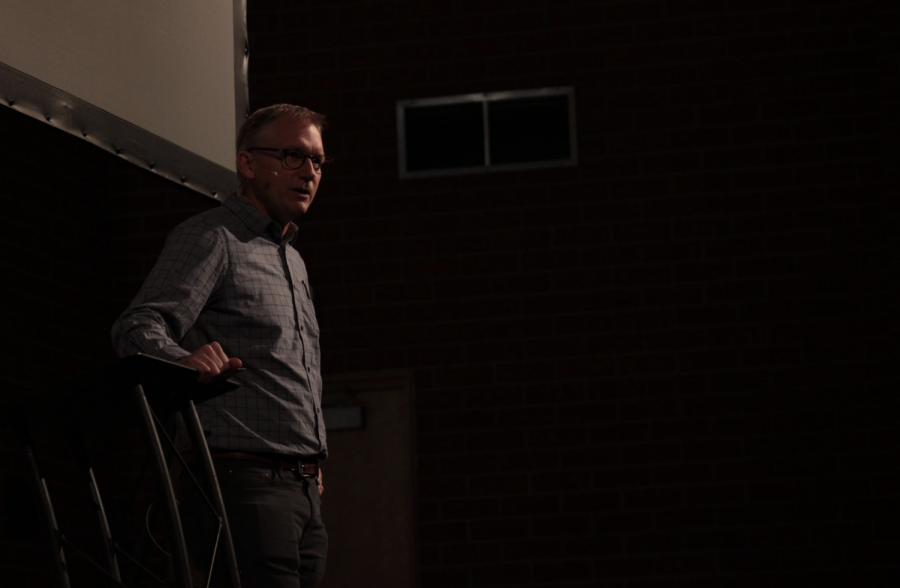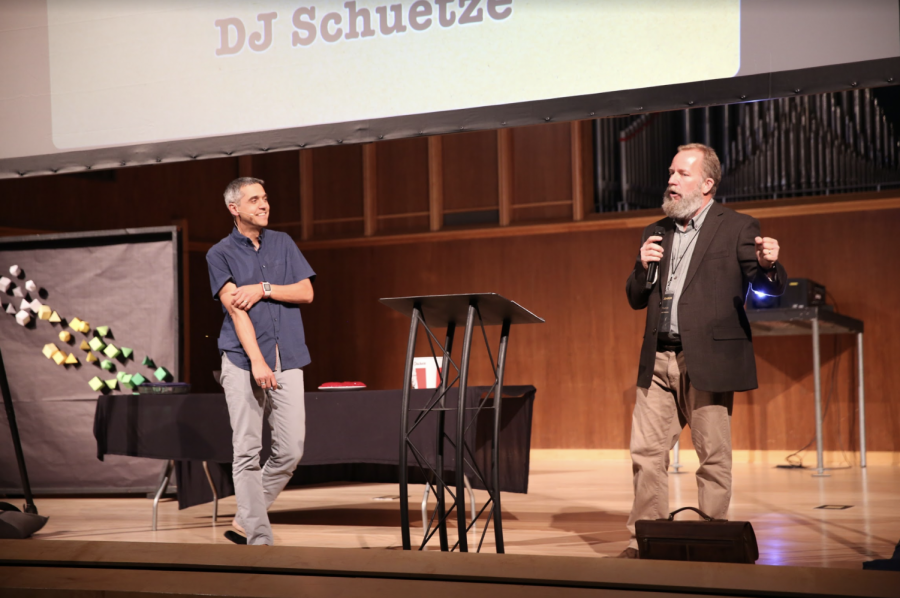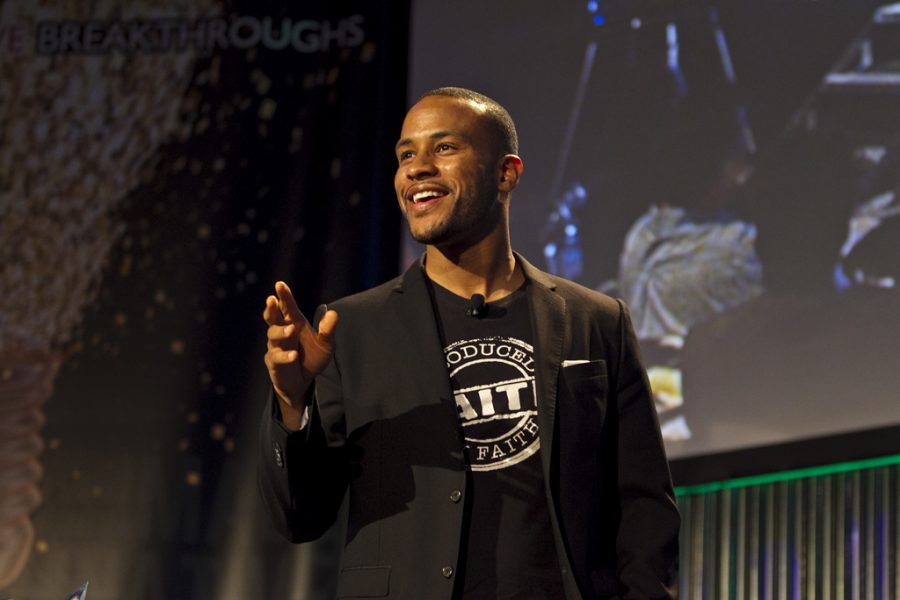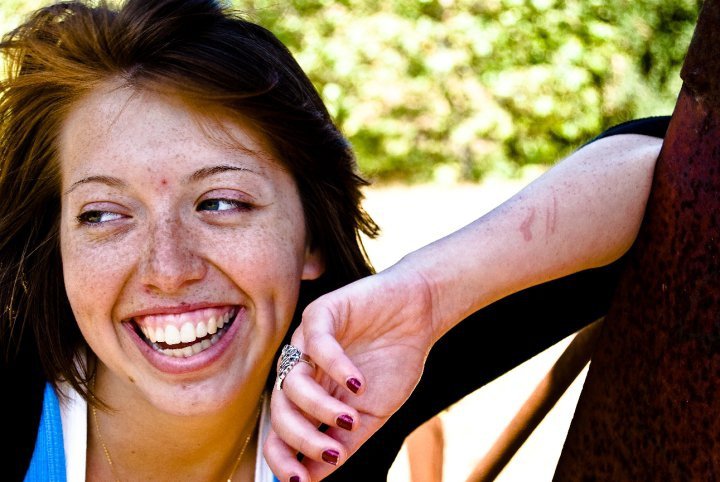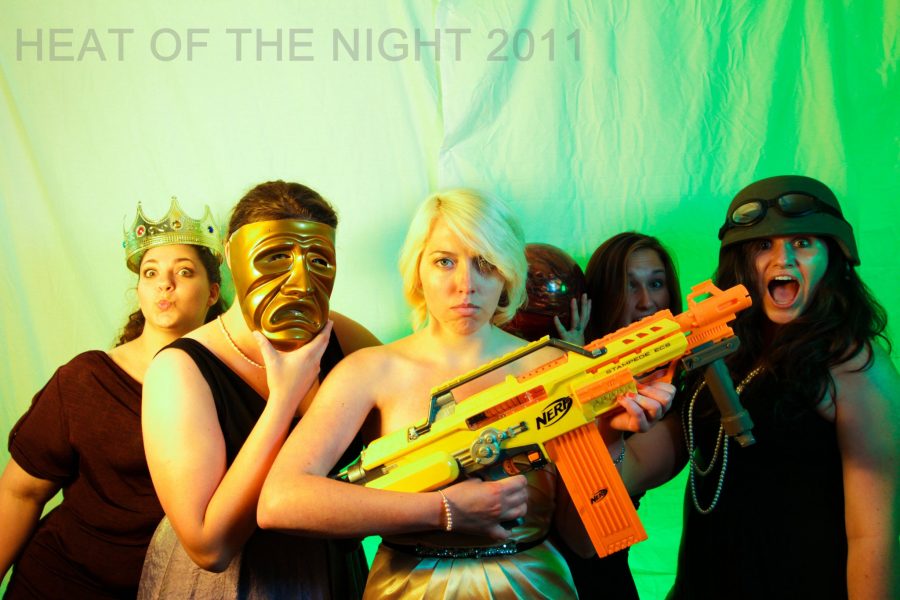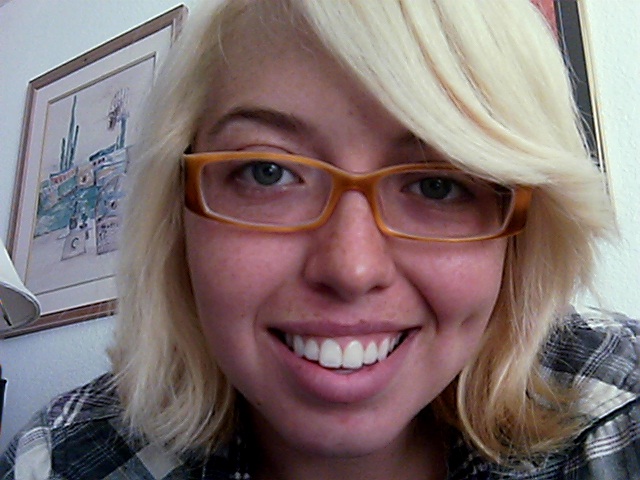Torrey Conference is over, but the real work has just begun
By Alison Bognuda
Saturday Oct. 23, 5:30 p.m.
Each year, I feel like there is at least one session that receives less then positive feedback from the general student body. This year, we really didn’t have one. Even the extended session with Annette Friesen Friday afternoon had a good turnout. Incredible considering it was an afternoon session on the last day of the conference, and it lasted four hours. There were about 60-70 people in Calvary Chapel going through the handout on conflict coaching with Annette. I was really encouraged to see so many students there, and was equally surprised and blessed to see some people who weren’t students. I’m not sure if they were professors or faculty, but it was cool to see different people taking advantage of this special session.
The series that Annette took us through is one she usually does with a church over the course of an entire day. But for Torrey Conference, she compressed the material into one four hour session. She did an excellent job contextualizing it for college students, often giving examples and scenarios that we could relate to. One of the most helpful tools was an activity where we could actively apply what we learned to a scenario of a student complaining to RA. We switched off role-playing as the RA/coach or the student with the complaint. It was really helpful to go back and forth applying the things she taught us such as active listening, getting to the heart of the conflict, and asking the right questions.
One series of questions she introduced us to was the Idol Searching questions. Once defined and identified, Annette explained, the answers to these questions lead us to what is really important to the individual. And these desires are often the underlying issue to the conflict at hand.
Overall, I found this session to be really practical and insightful. As I was sitting there, I became more aware of some of the mistakes I had made in the past when having a difficult conversation with someone. I also realized some of the idols in my own life I am not mindful of that cause conflict in my relationships.
Being on staff gave me an opportunity to see the conference from the inside. One of the things I enjoyed most was how personable our speakers were. I had a couple brief opportunities to talk to a few of them, and I was so blessed by their down-to-earth personalities. Each one of them is a people person. I guess that makes them people-people! That makes sense, since their entire lives are committed to helping people with their people issues. This made for an overall amazing conference. I hope you were all as blessed as I was by the sessions, the people, and the topic which I hope keeps giving back to the Biola community throughout this year.
Loving God by laying ourselves aside
By Johannah Sorensen
Friday Oct. 22, 1:45 p.m.
As I entered the gym for my last two conference credits, I was honestly excited for what the Lord wanted to speak to me. This Torrey Conference has been filled with wonderful ways to deal with conflict and it has been very convicting. This morning, Annette Friesen of Peacemaker Ministries informed us about how we can fall into the traps of following our own desires.
All of my life, I have been a people pleaser. I do not like conflict. When I come across a conflict with people I am not particularly close with, I would rather run away from it than face it. But, the Lord really showed me that in my close relationships I have, many times, sought my own way.
We learned on the first day that conflict doesn’t start with the issue at hand, but comes from our hearts. The deeper problem is the idols in our lives. The idol might be needing to be right, needing attention or needing to have control.
Annette talked about the trap that these idols set for us. It starts with a desire for something. Although that might not be a bad desire, it quickly turns into a need, then a demand. We strategize to find a solution to this demand. And as we chart out the solution in our minds, we develop expectations. When these expectations are not met, we are frustrated and disappointed. And the sting of disappointment invites judgment.
This pattern happens a lot in my life. I create these expectations and when they aren’t met I am unhappy. This is not love. “Love is willing self-sacrifice for the good of another that doesn’t demand reciprocation or require that the other person be deserving,” Annette said. “We make a choice to either follow our goals, or follow God’s.” This really stuck with me.
Although I may think I really love others, I realized need to take a closer look at my heart. In conflict, the problem is not with other person, but with me. I love 1 Corinthians 13:4-5 in the New Living Translation, “Love is patient and kind. Love is not jealous or boastful or proud or rude. It does not demand its own way. It is not irritable, and it keeps no record of being wronged.”
Although I think that I have been loving to those around me, I confess that I haven’t. I’m not always patient or kind. I demand my own way and get irritated with others.
At the end of the session, many students went to the front of the gym to kneel before the stage as a physical reminder of what our posture before God should be. Let’s all go kneel before the cross. Let’s live a life that loves like Christ. We have received undeserved love and forgiveness, so let’s live that out everyday by truly loving those around us
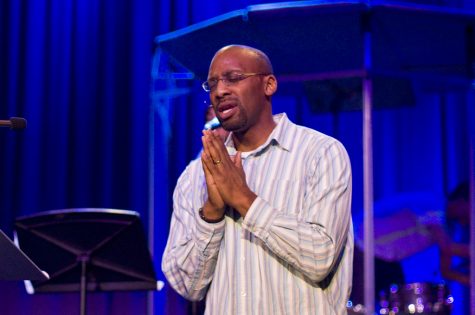
True community requires reconciliation
By Johannah Sorensen
Thursday Oct. 21, 9:45 p.m.
“Racial reconciliation isn’t colorblindness, it isn’t going to a yearly chapel service on diversity, it isn’t having a church of many colors, it’s a process,” said Ed Gilbreath editor of UrbanFaith.com.
As I sat and listened to Gilbreath talk about true reconciliation, I couldn’t help but remember the verse I had just heard in my theology class. Galatians 3:28 says, “There is neither Jew nor Greek, slave nor free, male nor female, for you are all one in Christ Jesus.” We are all united by the love of Christ, and should live that unity out in our lives.
Community is something that is truly valued at Biola. As we are here, learning more about the character of God and all He has done for us, we need to remember that we are all made in His image. We aren’t to be colorblind, but instead embrace the differences that we have in a way the rest of the world can’t.
Each and every person is made in God’s image, and our different cultures and backgrounds all reflect that image. Through our diversity God can be more clearly understood, Gilbreath said. By living in a way that honors Him, we are living in true community with other believers.
John 17:23 says, “May they be brought to complete unity to let the world know that you sent me and have loved them even as you have loved me.” If we as Christians aren’t able to live in unity, then why would unbelievers want to follow Christ?
The night ended with the song “Shape My Heart” by Jason Houtsma and Sean Hall. The lyrics helped me to express exactly how I want to be. The chorus is, “Shape my heart, until it’s just a true reflection of who you are, Lord you have my full affection.”
Jesus was not someone who was concerned about race, social status, occupations or family background. In our American culture, we tend to focus on these things, even if subliminally. Gilbreath talked about being an example of Jesus – who reached out to everyone. Ultimately, it’s not about us, it’s about God.
How can we honor Him in our lives? When we live with one another in a way that celebrates differences and embraces our diverse cultures, we are able to see the image of God more clearly. When we do this, we will be able to experience true community.
Heaven will not be a place of segregation, but a place where everyone comes together, praising and giving glory to God. Let us live our lives in a way that reflects this.
“After this I looked and there before me was a great multitude that no one could count, from every nation, tribe, people and language, standing before the throne and in front of the Lamb. They were wearing white robes and were holding palm branches in their hands. And they cried out in a loud voice:
‘Salvation belongs to our God, who sits on the throne, and to the Lamb.’” (Rev. 7:9-10)
Stepping past the stereotypes
By Charles Regli
Thursday Oct. 21, 5:15 p.m.
As a freshman arriving at Biola, I never really understood why the university placed such a high priority on cultural and ethnic diversity. My thought process went something like this: if we seek to see each other as God’s beloved people that He created as individuals in His image, then why focus on our differences of culture or ethnicity? Emphasizing these differences seems to define people according to their race, history, or culture, and reinforces the stereotypical labels that divide us. Does not seeing each other as people mean that we look past the stereotypes and labels and just treat each other as we would treat anyone else?
This was my view until I began encountering Biola’s perspective on diversity through my First Year Seminar class and several of President Barry Corey’s addresses. Biola does not see diversity of culture and ethnicity as something to be overlooked, but rather as directly addressed. I seemed to be missing something.
Fortunately, Ed Gilbreath’s session on Thursday afternoon of the Torrey Conference helped to shed some light on the issue for me. He fully agreed that we need to stop placing stereotypes on each other. How can we speak face to face or see eye to eye as long as we are looking and speaking with an imagined character? Gilbreath made his point clear. We need to drop the stereotypes, and see each other as we really are: real people, with real problems, who need God and each other desperately. However, he did not seem to think that ethnic or cultural diversity is something to be overlooked either. Instead, Gilbreath emphasized again and again the need for listening to perspectives different from our own.
Here is where I was ignorant. A person’s race and culture is a huge part of who he is. Yes, natural differences can create conflict, as Tim Pollard taught us Wednesday, but acting like they are not real will not help the situation. Throughout Torrey Conference, we have been told that the answer to conflict is reconciliation, and to reconcile we need to directly address our differences, not overlook them. We need to address what makes us different and try to understand each other’s perspectives. Gilbreath noted that there is a great deal to be learned from each other, if we will only take the time to listen.
Gilbreath also reminded us of God’s call upon the church to be ministers of reconciliation. The division in the church is a stumbling block for unbelievers to be reconciled to God. We are called to understand the differences of culture and ethnicity that can divide us, and instead reconcile them with each other. In this manner, we can be both diverse and united. We can be completely ourselves and still work together.
So, now I have a new perspective: we cannot belittle each other with stereotypes, nor can we ignore our differences, but we can and should be reconciled.
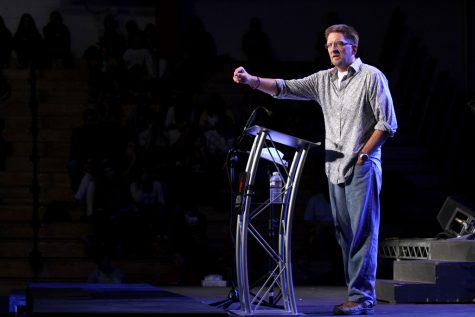
Forgiveness, not friend breakups
By Alyson Luthi
Thursday Oct. 21, 3 p.m.
“There’s tons of advice on how to break up with your girlfriend or boyfriend but hardly any on how to go about breaking up with a friend,” Gary Friesen, executive Vice President of Peacemaker Ministries began at Thursday morning’s session of Torrey Conference. But instead of proceeding to offer advice on severing relationships, Friesen pointed towards a Biblical response to conflict through seeking restoration and reconciliation.
When should we seek restoration? Friesen pointed to Matthew 15:18 and Matthew 5:23 to illustrate the necessity of seeking restoration both when we have been hurt and when we are aware someone has been hurt by us. We should go with a humble heart seeking to honor God through restoration. This translates into treating the other person with respect such as seeking to listen before choosing a response and physically meeting to avoid communication that can be ambiguous or misleading.
At the heart of reconciliation is forgiveness. Reconciliation is only possible when both parties experience forgiveness; it cannot be forced. Friesen concentrated on forgiveness as our individual responsibility whether or not reconciliation takes place.
Forgiveness is not a feeling – it is a decision that fully acknowledges the ramifications of offense and chooses to cover that debt with grace. Therefore, responding to an apology by dismissal or trying to forget what has happened does not equal forgiveness.
“Forgiveness is not forgetting,” Friesen explained. “It is remembering in a redemptive fashion.” This means not dwelling on the incident or resurrecting past offenses once true repentance has occurred. Rather we are to build each other up through grace, seeking change and accountability.
When reconciliation is not possible because the other person has not repented, turn to Luke 6:27-36. God loved us while we were still unrepentant, so our response in these situations should reflect the response of God towards us.
The morning’s message humbled me as I recalled the extent of God’s ongoing forgiveness. Friesen compared the unforgiving Christian to a kinked garden hose. When I don’t forgive others, I trivialize the extent of God’s grace I have experienced in my own life. We Christians should appreciate forgiveness more than anyone because we have experienced it the most. By the grace of God, we can respond to sin with forgiveness, remembering with thankfulness our reconciliation with God.
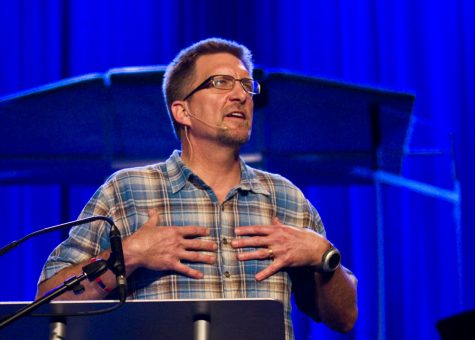
Gary Friesen, Peacemaker Ministries’ Executive Vice President, speaks at the third session Wednesday night.
No ifs, buts or maybes in conflict resolution
By Jessicah Gist
Wednesday Oct. 20, 10:15 p.m.
“If,” “but,” and “maybe,” are three key words that will always ruin an apology. In session three of Torrey Conference 2010 Gary Friesen reminded us that conflict is everywhere and that it starts in our own hearts.
When I first thought of conflict resolution, I thought it was all going to be about how she hurt me, and he said this, etc. But I have been pleasantly surprised. Turns out that conflict resolution is more about others than about me and my hurting. I understand that everyone hurts and people are rude, but I was delighted to hear that our problems, my problems, should in the end be resolved through Christ.
Friesen also told us that being a peacemaker is not about being a “nice” person. Going out into the world as a Christian can be hard because sometimes we have to say and do things that are not always taken as “nice.” Despite common misconception, Jesus never said that being nice is the Christian duty.
“God sent his Son to make dead people alive, not bad people nice,” Friesen said. Christians are meant to face conflicts head on, equipped with the tools they need to resolve them. But when I consider that so many people in the world hate me for being a Christian, I would rather run and hide than face the conflict in front of me.
Friesen also shared that a heartfelt confession is central to resolving conflict. A bad apology makes things worse, but a good confession drives you to the cross and moves both people closer to forgiveness. When making an apology, you need to own it, admit it, share with those involved, accept the consequences, change, and – the hard one – ask for forgiveness. Resolving a conflict can be a long process. Friesen identified many steps that I didn’t even know were necessary in an apology.
When looking to end conflict, forgiveness is always the goal, even if it is not always received. Sadly I believe this is what scares people off from working to resolve conflict. But as Christians it is our responsibility to face our sin and work things out in a way that will bring God the glory. God is in control and with us wherever we go, which is a comfort to know and all the more reason to be bold to resolve conflict.

Students lift their hands in worship at the beginning of the second session of Torrey Conference held in Chase Gymnasium. After worship, Tim Pollard spoke about the hope and impact of the gospel in relation to peacemaking.
Finding unity in the midst of diversity
By Patricia Diaz
Wednesday Oct. 20, 5:30 p.m.
As students streamed out of the cold, wet day into the safety of various auditoriums for the second session of Torrey conference, I was struck by the contrasting of vastness and closeness. Though several thousand people were filling the gym, a friend and I discovered we each knew or recognized most students who walked by. We could chalk it up to the size of Biola’s student population, or we could join Disney’s chorus of dolls singing “It’s a small world after all!”
Either way, I find it amazing that for three days, the entire Biola community turns out to hear the same message. Despite our differing motivations for attending, the fact remains that we are there together. We can’t help but be affected in some way.
As we centered ourselves again on the Lord through opening worship songs, Tim Pollard’s message of “unity not uniformity” from the morning session echoed through my mind.
Looking around, I saw faces upturned in worship, hands lifted in the air, and heaven written on many countenances. I caught a new glimpse of people I had previously judged as they drew near to glimpse God on His throne. One student alternated between sinking to his knees and hopping up and down in bursts of joy.
Yet I didn’t have to look far to find differences either. A student near me mentioned how much it would have meant to him if we sung the last worship chorus in Spanish. And despite the speaker’s intriguing British/Billings, MT accent, I watched several students fight a losing battle to stay awake. I couldn’t judge them with Tim Pollard’s voice literally in my ear reminding me of the forgiveness I am called to show others in light of how God has forgiven me.
“We are the most forgiven people in the world, we can become the most forgiving,” he proclaimed, evoking a burst of applause.
Continuing his message this morning about the nature of conflict, Pollard said it is possible to change the patterns of conflict and emphasized understanding ourselves as the first step. He encouraged us to examine the slippery slope of conflict and determine our tendencies: Escape or Attack.
But mostly, he rallied us around the key to relationships: the Gospel. The simple but powerful message that not only saves us for eternity but affects how we are to live now.
“When the Gospel gets big in your hearts, relationships get easier in your lives,” he said.
The phrase “easier said than done” comes to mind. While I nodded my agreement to all that he said, within minutes of walking out the door, I caught myself judging someone in anger. I grimly remembered Pollard mentioning that trying harder will not make me more loving. It’s true. Only God changes hearts.
“I would love to go on,” he said with a glance at the clock, “but I can’t, and I won’t and I shouldn’t.” But we must go on Biola. We must stay near to the Gospel message and the power of Christ that is only thing that can transform ourselves and our relationships. Unity is worth fighting for.
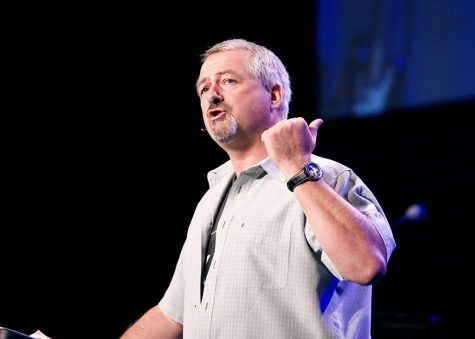
Sparks, gasoline, and the fires of conflict
By Mychel Hardige
Wednesday Oct. 20, 12:15 p.m.
I did not know what to expect in the first session of this year’s Torrey Conference. But, knowing that the subject was going to be about mending relationships with people, I knew that it would be off to a great start. Tim Pollard really spoke out to me in the message. I liked how he used a sense of imagery to capture what he was trying to talk about.
When he showed a video clip depicting a husband and wife fighting in their kitchen late at night, I felt in my spirit that the vignette spoke to the entire audience spread between the Chase Gymnasium, Sutherland Auditorium, and Crowell Music Hall. Everyone goes through major conflict in their lives and no one can solve it on their own.
There were four pieces of his message that moved me significantly; how desires escalate into demands, how cravings underlie conflicts, how cravings replace God, and the definition of idols. All of these concepts play a devastating role in demolishing our relationships by conflict and causing us to become distant from one another.
One helpful idea was his definition of idols. Pollard explained that idols are something you sin to obtain or sin if denied. I know there are times in my life when I do not listen to the Lord when it comes to conflict. I try to find another outlet to ease my frustrations and blame my conflicts on other people and not on myself.
Cravings were another subject that opened my eyes to the state of our society. Pollard explained that our culture’s main message is that we should fight to have our own way because we deserve it. This idea fuels the fire of conflict causing us to become more selfish and not think of other people. It happens with divorce, friendships, estrangement, things we have all witnessed and possibly been involved in.
When it comes to conflict, I hope that people can solve it biblically, putting God first and knowing that He can solve anything our hearts crave or desire.
Monday’s musings: the AS office and this year’s speakers
Monday Oct. 18 – Days to go: 2
Even as the stress of midterms and papers loom over many of you, a handful of students find ourselves trying to balance school along with our Torrey Conference responsibilities. Surprisingly enough, there really isn’t a lot of stress among the staff. Just a quiet reality that there is a lot to be done.
If you were to walk into the AS office right now, you would find a little desk stuck in the far back corner where members of Chapel Board and Torrey Conference staff are working on the last minute details for the conference. We’re making name tags, designing power point slides, and preparing picture frames with Scriptures and reflections (that’s my job for the evening). It’s amazing to see everything coming together.
Preparing for Takeover Tuesday:
Tomorrow evening, some of us will be gathering to begin our takeover of the Lower Rose classrooms and the AS Conference room. Months of planning will come down to a single night where everything basically explodes. It’ll be crazy, but it’ll also be fun. We even have a bedtime….no, seriously; I’m not making this up. Lisa is making us go to bed by 1 a.m.
I’ve had the opportunity to talk to a few students, and they tell me they have no idea who the speakers are and have never heard of them before. So here’s a little background on the people you’ll be listening to for hours on end this week.
Meet this year’s speakers:
The Businessman: The first speaker is the vice president of distribution and strategy, Tim Pollard. In his job with Peacemaker Ministries, he focuses on helping organizations translate missions and visions into strategy with the application of Kingdom principles to business practices. His topics will be “The Nature of Conflict” and “The Hope and Impact of the Gospel” for the first two sessions on Wednesday.
The Attorney: The next two sessions will be covered by another member of Peacemakers, Gary Friesen. As the executive vice president, he incorporates his legal background with his knowledge of conflict resolution to aid churches and foundations in developing strategies on conflict resolution with both biblical and legal safeguards. He will be speaking on “God’s Glory and Coming Clean” and “Go…and be Reconciled” Wednesday night and Thursday morning.
The Author: For the rest of Thursday, Ed Gilbreath will be with us talking about racial and cultural reconciliation. He is the author of “Reconciliation Blues: A Black Evangelical’s Inside View of White Christianity” and coauthor of “Gospel Trailblazer”. He is also the director of editorial for Urban Ministries, Inc., the editor and chief of the online magazine UrbanFaith.com, and an editor for Christianity Today.
The Counselor: Lastly, Annette Friesen from Peacemakers will be joining us in our closing session on Friday morning and for the conflict coaching intensive Friday afternoon. (These sessions will be worth 2 credits since they are longer.) She is a Certified Christian Conciliator and her job includes conciliating disputes and being an instructor for ministry training events. She speaks to various groups, including women’s groups and Christian educators. Her favorite peacemaking topic is marriage, and she brings 33 years experience of it in her marriage to Peacemaker’s director of ministry relations Rick Friesen.
So there you have it. These are the people who will be sharing with you this week their heart for peace in relationships. I hope you are starting to get as excited as I am for the conference!
Starting the countdown to Torrey Conference 2010
Sunday, Oct. 17 – Days to go: 3
Rome wasn’t built in a day. Neither is Torrey Conference. There have been months and months of planning and prayers for this campus-wide event that will take over Biola this week. I know this because I have been given the incredible privilege of being a part of the 2010 Torrey Memorial Bible Conference staff.
This year the theme is entitled “Blessed are the Peacemakers: Redeeming Relationships in the Conflict in our Lives.” Our heart as staff is that you learn about, and if you are willing, engage in reconciliation. My personal prayer is that you will be reconciled with the Father and with your brothers and sisters, because that is what will make us the Bride.
If you were expecting just another conference, I think you’re going to be surprised at some of the new things we’ve added this year.
Prayer rooms and worship time added
With seven sessions in three short days, it is inevitable that you are going to feel overwhelmed and possibly unsure of things in your own life. Since the theme is focusing on conflict, this may be an even bigger reality for some of you. To help you through this there will be four different prayer rooms, including a 24-hour room in the AS conference room, as well as a new installment of extended worship and prayer on Meztger Lawn after each evening session.
We will also be continuing the reflection cards after the morning and afternoon sessions. I highly encourage everyone to do at least one, not just because you can get extra conference credit (which is awesome), but also because the reflection cards are a great way to process what you hear from the speakers and receive from the Spirit.
Involving art in the conference
As a staff, something that has come up is our desire to see more art involved. As a result, we will be incorporating this into the prayer rooms, providing art supplies for student to express what they’re feeling., We are arranging to have some art students make sidewalk chalk art around the mail boxes. I am personally really excited to see what God does through these talented artists. Their drawings will, of course, reflect the theme of peacemaking and reconciliation and I hope you will all stop and take a look at what they create.
I know for some of you, this is just another conference you’re required to go to. But here’s the deal: God is in this conference. I know that because as we sit together as staff, as friends, as family, I can feel the anticipation for what the Lord has for you, students of Biola. The Lord wants to change your life. His desire is to see you reunited with Him in communion and fellowship and intimacy. So, are you ready for peace?





